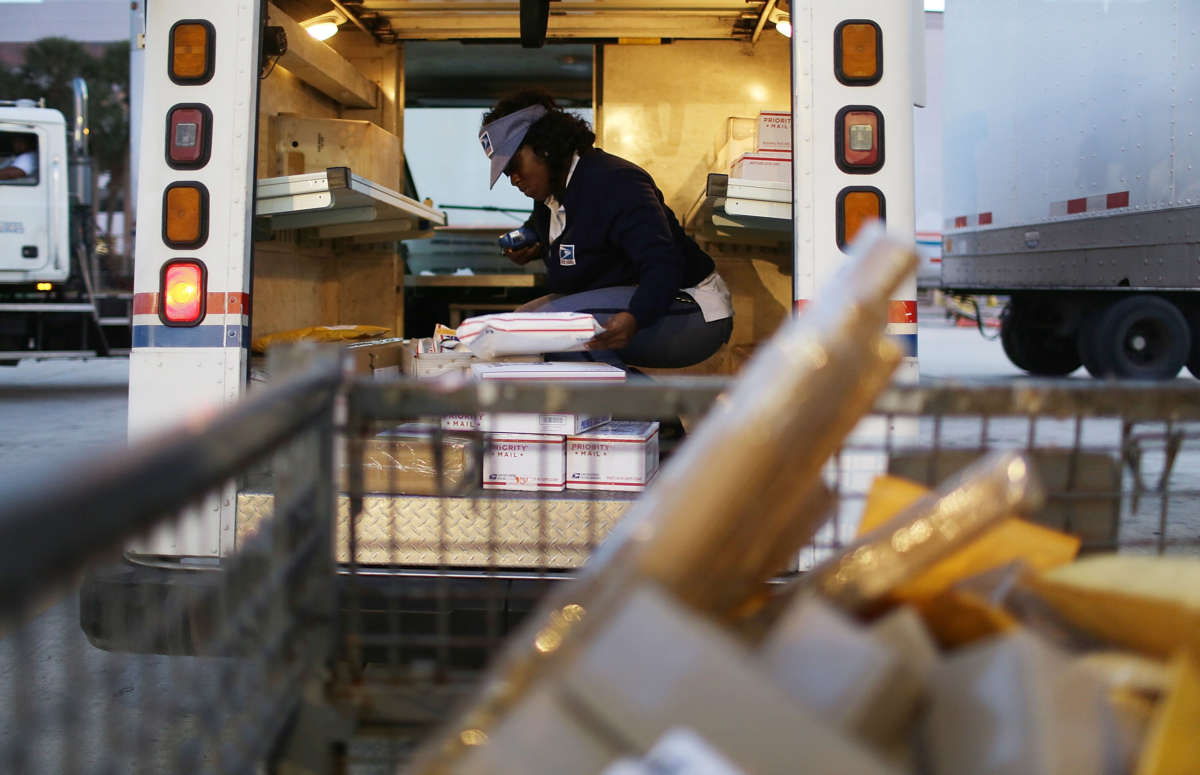A simple grievance can take many months to get results. But at the post office where I work, we got fast results defending our breaks with a different approach: direct action.
I’m a city carrier assistant (CCA) — part of the lower-paid second tier of letter carriers — in Naples, Florida. The retention rate for CCAs nationwide hovers around 20 percent.
Letter carriers start each day by sorting the mail and loading it into our trucks. In my post office, Mondays through Saturdays we take our first 10-minute break together inside the office, with the air conditioning, before heading out to start deliveries.
We used to take our breaks together on Sundays, too. We would chip in for donuts and coffee, a sign of our camaraderie.
But in April, the Postal Service implemented a new way of doing the Sunday package runs. (On Sundays we don’t deliver letters, just parcels, mainly for Amazon.) They had half the workforce coming in first to load trucks, and the other half coming in later to start deliveries — and we were no longer allowed to take our Sunday morning break in the office.
By the middle of the summer, we were back to the old way of loading and delivering. Everyone was back to clocking in at the same time on Sundays, 8:30 a.m.
But management was still refusing to let us take Sunday morning breaks together. They wanted us to hit the road and take our breaks out on the street, in the heat.
“It’s Break Time”
At 9 a.m. on Sunday, August 21, my alarm went off as it usually does Mondays through Saturdays. I said what I usually say those days: “It’s break time, ladies and gentlemen.” Three other workers and I started walking towards the break room.
Our supervisor stated, loudly, in front of all of us on the loading dock, that there’s no breaks on Sundays. We shrugged that off and went to the break room. A minute later he was standing over us.
He said we had two choices: Get back to work and take our 10-minute break out on the street, or go home.
We weren’t expecting an ultimatum. But the four of us looked at each other, and we all said we would go home. We scanned our badges to clock out, and walked to our cars together in a state of shock.
When I got home, I typed up a report on what had happened and posted it on one of the Facebook groups for union letter carriers. My post got 500 likes and a lot of positive feedback.
Quick Results
By Monday morning, our union president and the postmaster had discussed what happened and started to discuss a solution.
A couple days later, management gathered us all together for a meeting to explain the new memorandum of understanding giving us back our Sunday morning office break, so long as we finished loading our trucks first. They posted it near the schedule for everyone to read.
Twice during the week I was also called into meetings with management — once to discuss my attendance, and once to be asked a bunch of open-ended questions, such as “Was this premeditated? Were you planning all this?” I told them yes, of course I was planning to take a break. But I wasn’t issued any discipline.
The following Sunday I brought in some juice and donuts for my co-workers to enjoy before they started delivering packages in the Florida heat.
Union Strong
My co-workers had to work harder and longer than normal that first Sunday when we chose to go home. But most are pleased with the result. Now every CCA across Naples — not just in my office — gets to take a break inside on Sundays.
A brand new CCA started his career that same day, and was busy loading his truck when I made the decision to go home. He recently moved to Florida, after many years of having no union and bad bosses in New York.
He has no bitterness towards me and the others who took action. Instead, witnessing from the beginning of his career the power of a union, he’s proud to be union and excited to get active. He recently attended his first union meeting.
Maybe this will help with the Postal Service retention rate and help build a stronger, younger union. I’d say that’s a victory.
Join us in defending the truth before it’s too late
The future of journalism is uncertain, and the consequences of losing it are too grave to ignore. To ensure Truthout remains fearless, tough, and 100 percent independent, we rely on reader support. Every dollar you donate goes directly toward the costs of producing news you can trust.
Please give what you can — because by supporting us with a tax-deductible donation, you’re not just preserving a source of news, you’re helping to safeguard what’s left of our democracy.
